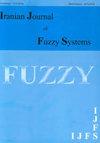(2007-6020)构建z数值两两比较矩阵的一致性驱动方法
IF 1.2
4区 数学
Q1 MATHEMATICS
引用次数: 1
摘要
利用一致性的概念来估计偏好知识的质量及其稳定性,从而对决策方案进行可靠的评估。众所周知,采用一组严格的一致性条件来保持比较元素之间偏好强度的合理性。这些要求在决策者理性有限、偏好部分可靠的现实情况下是无法实现的。在这项研究中,我们提出了一种方法来推导这种情况下的一致性驱动的偏好度。偏好程度用z数来描述,以反映偏好知识的不精确性和部分可靠性。用z值变量的优化问题来制定一致偏好的设计。考虑一个现实世界的决策问题来说明所提出的方法的应用,并与现有技术进行比较。本文章由计算机程序翻译,如有差异,请以英文原文为准。
(2007-6020) A consistency-driven approach to construction of Z-number-valued pairwise comparison matrices
The notion of consistency is used to estimate the quality of preference knowledge and its stability for reliable evaluation of decision alternatives. It is well-known that a set of strict consistency conditions are used to keep the rationality of preference intensities between compared elements. These requirements are not achievable in the real situations when decision maker has limited rationality and partially reliable preferences. In this study, we propose an approach to deriving consistency-driven preference degrees for such kind of situations. A preference degree is described by a Z-number to reflect imprecision and partial reliability of preference knowledge. An optimization problem with Z-number valued variables is used to formulate design of consistent preferences. A real-world decision making problem is considered to illustrate application of the proposed method and conduct comparison with an existing technique.
求助全文
通过发布文献求助,成功后即可免费获取论文全文。
去求助
来源期刊
CiteScore
3.50
自引率
16.70%
发文量
0
期刊介绍:
The two-monthly Iranian Journal of Fuzzy Systems (IJFS) aims to provide an international forum for refereed original research works in the theory and applications of fuzzy sets and systems in the areas of foundations, pure mathematics, artificial intelligence, control, robotics, data analysis, data mining, decision making, finance and management, information systems, operations research, pattern recognition and image processing, soft computing and uncertainty modeling.
Manuscripts submitted to the IJFS must be original unpublished work and should not be in consideration for publication elsewhere.

 求助内容:
求助内容: 应助结果提醒方式:
应助结果提醒方式:


